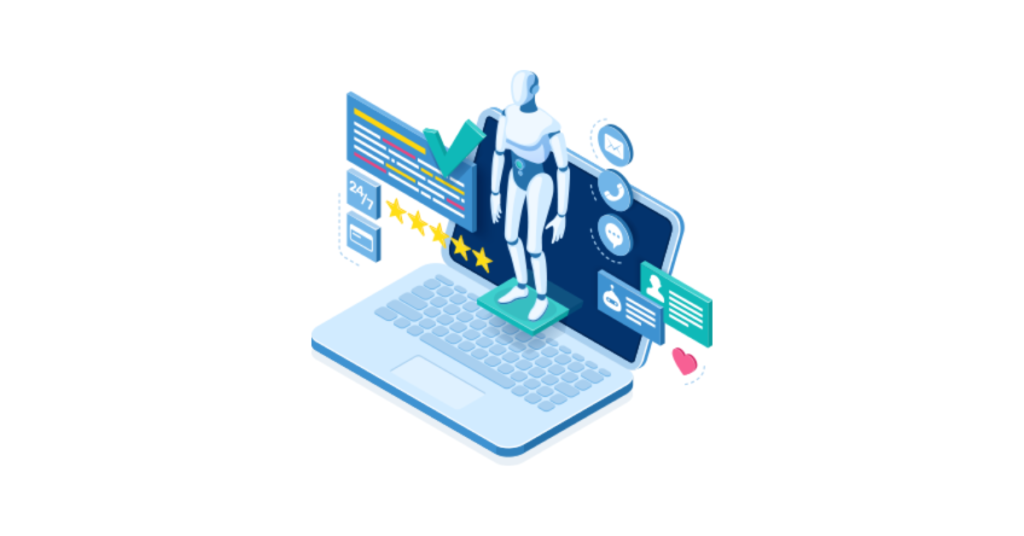Job of Artificial Intelligence in Application Development
Artificial Intelligence (AI) has revolutionized application development, becoming a game-changer in multiple industries today. The AI industry is growing at an unprecedented rate, with the current market size of AI expected to reach 300 billion US dollars by 2026. AI has transformed the way applications are developed by introducing cognitive technologies such as Natural Language Processing (NLP), Machine Learning (ML), Robotics Process Automation (RPA), and Deep Learning (DL). AI has also led to the development of conversational user interfaces and virtual assistants, making interactions between humans and machines seamless.
This paper aims to discuss the role of AI in application development, how AI is changing the way applications are developed, and its impact on industries. It will explore AI-powered applications in various industries, such as healthcare, retail, finance, and more.
Introduction
Artificial Intelligence (AI) is an incredibly transformative technology that has been changing the way applications are developed, deployed, and utilized by organizations. AI-enabled applications are becoming a standard for many businesses, allowing them to automate processes, streamline operations, and gain insights from data.
AI refers to the development of automated systems that can perform tasks that would typically require human intervention. These tasks include tasks such as reasoning, learning, perception, and decision-making. AI-powered applications can handle tasks such as image and speech recognition, natural language processing, and predictive analytics that would have been impossible without this technology. AI has been particularly transformative in application development, allowing developers to create smarter applications that can anticipate the needs of users and interact with them more efficiently.
AI has introduced a range of cognitive technologies such as Machine Learning (ML), Robotics Process Automation (RPA), and Deep Learning (DL), which have transformed the field of technology. For instance, developers can leverage machine learning algorithms to make predictions based on data, while RPA lets developers automate repetitive tasks. These technologies are making applications more powerful, user-friendly, and efficient.
This paper aims to discuss the role of AI in application development in various industries, the impact of AI on industries, how AI is changing the way applications are developed, and its implication for the future of technology.
The Impact of AI on Application Development
The impact of AI on application development has been significant, facilitating the development of intelligent applications that can perform complex tasks, learn from data, and interact with users more effectively than ever before. AI-powered applications can analyze vast amounts of data within a shorter time frame, making it easier to extract insights from data. Below are some of the significant ways in which AI is changing application development:
1.AI is improving the speed and accuracy of application development
AI can automate many of the repetitive tasks involved in application development, including testing, debugging, and code optimization. The use of AI in application development has led to increased productivity, allowing developers to build, test, and deploy applications at a faster rate than ever before.
2.AI is enabling the development of intelligent applications
AI is driving the development of intelligent applications that can perform complex tasks, learn from data, and interact with users more effectively. Using machine learning, developers can create applications that can adapt to changes in user behavior and anticipate their needs. For example, AI-enabled chatbots can understand natural language, interpret user queries, and provide relevant responses in real-time.
3.AI is facilitating predictive analytics
AI can analyze vast amounts of data and provide insights that can drive business decisions. With AI-powered predictive analytics, developers can create applications that can predict the likelihood of future events based on past data. This capability is particularly important in industries such as finance, healthcare, and retail, where accurately anticipating customer behavior can have a significant impact on business success.
Additionally, you can check expert application development company in india in order to know more
4.AI is enabling smarter automation
AI can automate many of the repetitive tasks involved in application development, reducing the workload for developers and enabling them to focus on more complex tasks. For instance, developers can use RPA to automate data entry, freeing up their time for more important tasks such as application design.
5.AI is leading to the development of conversational interfaces
AI-powered conversational interfaces such as chatbots and virtual assistants are revolutionizing the way users interact with applications. Conversational interfaces use natural language processing to understand user queries and provide relevant responses, making interactions between humans and machines more natural and user-friendly.
6.AI is improving application security
AI can improve application security by identifying vulnerabilities and threats before they exploited. Using AI-powered intrusion detection systems, developers can monitor applications for suspicious activities and respond before any damage is done.
AI in Various Industries
AI has had a significant impact on various industries, enabling organizations to streamline operations, improve efficiency, and enhance customer experience. Below are some examples of AI-powered applications in various industries:
1.Healthcare
AI is transforming the healthcare industry by enabling the development of applications that can diagnose diseases, perform surgical procedures, and analyze patient data. AI-powered applications are improving patient outcomes by identifying diseases at an early stage, predicting complications, and supporting clinical decision-making. The use of predictive analytics in healthcare is particularly important, allowing healthcare providers to.
Also read : hire android app developers in india

